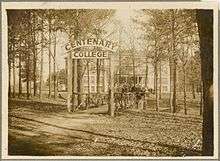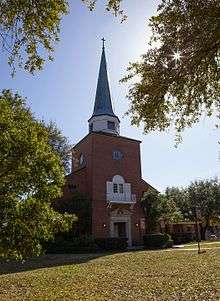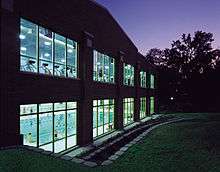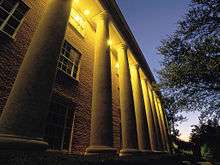Centenary College of Louisiana
| Motto | Labor Omnia Vincit (Work Conquers All) |
|---|---|
| Type | Private liberal arts |
| Established | 1825 |
| Affiliation | United Methodist |
| Endowment | $138.5 million[1] |
| President | Christopher L. Holoman |
Administrative staff | 228 |
| Undergraduates | 523 |
| Postgraduates | 107 |
| Location | Shreveport, Louisiana, U.S. 32°29′02″N 93°43′55″W / 32.484°N 93.732°WCoordinates: 32°29′02″N 93°43′55″W / 32.484°N 93.732°W |
| Campus | Urban, 117 acres (162,000 m²) |
| Colors | Maroon & White |
| Athletics | NCAA Division III – SCAC |
| Nickname | Gentlemen & Ladies |
| Website |
www |
 | |
Centenary College of Louisiana is a private, four-year arts and sciences college located in Shreveport, Louisiana. The college is affiliated with the United Methodist Church. Founded in 1825, it is the oldest chartered liberal arts college west of the Mississippi River and is accredited by the Southern Association of Colleges and Schools (SACS).
History

Centenary College of Louisiana is the oldest college in Louisiana and is the nation's oldest chartered liberal arts college west of the Mississippi River.[2] Centenary traces its origins to two earlier institutions. In 1825, the Louisiana state legislature issued a charter for the College of Louisiana in Jackson.[3] Its curriculum included courses in English, French, Greek, Latin, logic, rhetoric, ancient and modern history, mathematics, and natural, moral, and political philosophy.[4] In 1839, the Mississippi Conference of the Methodist Episcopal Church, South, established Centenary College, first located in Clinton, Mississippi, then relocated to Brandon Springs.[5] When the College of Louisiana lost the financial support from the state legislature in 1845, Centenary College purchased the facility and moved to Jackson.[6]

In 1846, the college’s trustees changed the institution’s name to Centenary College of Louisiana and adopted the alumni of the two predecessor colleges.[7] During the 1850s, enrollment reached 260, and the college constructed a large central building, which included classrooms, laboratories, literary society rooms, a library, a chapel, offices, and an auditorium with seating for over 2,000 people.[8] This prosperity halted with the American Civil War. Following a meeting on October 7, 1861, the faculty minute book states, “Students have all gone to war. College suspended; and God help the right![9]” During the war, both Confederate and Union troops occupied the campus’s buildings.[10] Centenary reopened in the fall of 1865, though struggled financially through the remainder of the nineteenth century. In 1906, the Louisiana Conference of the Methodist Episcopal Church, South, accepted an offer from the Shreveport Progressive League to relocate the college.[11] The Jackson campus now serves as the Centenary State Historic Site operated by the Louisiana Office of State Parks; it is listed on the National Register of Historic Places.[10]
Centenary opened in Shreveport, Louisiana, in 1909.[12] Enrollment and course offerings increased during the 1920s, and Centenary received accreditation from the Southern Association of Colleges and Schools in 1925.[13] During the 1920s and 1930s, the college’s football program earned fame for defeating such teams as Baylor, LSU, Rice, SMU, and Texas A & M.[14] The Centenary College Choir, formed in 1941, began performing throughout the region and eventually expanded to making national as well as international tours.[15] In 1942, Centenary acquired a satellite campus, the former Dodd College, which served as a pre-flight training facility for air force cadets.[16] Following the Second World War, the college undertook many new construction projects – dormitories, a cafeteria, a science building, a religious education center, a chapel, an expanded student center, a library, a theater, and a music building.[17]
Campus
Centenary College's campus spans sixty-five acres and is located two miles south of downtown Shreveport. The Dr. Ed Leuck Academic Arboretum, located in the heart of campus, is home to more than 300 species of plant life. [18]

Major buildings
- The Anderson Choral Building, named in memory of G. M. “Jake” and Dr. Gertie Anderson, longtime trustees and benefactors of the College, the building houses the Nancy Mikell Carruth Choir Room, the Dr. Alberta E. Broyles Choral Room, and the Harvey and Alberta Broyles Choral Lounge. The Anderson building also contains a soundproof practice room and atrium.[19]
- The Brown Memorial Chapel was erected in 1955, after a gift was made by the late Paul M. Brown, Jr., Chairman Emeritus of the Board of Trustees, and his brother, Colonel S. Perry Brown, a life member of the Board, in honor of their parents. The Chapel was renovated and rededicated in January 2003 and hosts religious services and special events.[19]

- Bynum Memorial Commons, the cafeteria, built in 1956, was named in 1974 to honor Robert Jesse Bynum, New Orleans businessman and benefactor of the College.[20] A generous grant from the Frost Foundation funded a 2006 renovation of the entire building, including the Edwin Frost Whited Room and the Centenary Alumni Hall of Fame.


- The Gold Dome, completed in 1971,[21] is a physical education facility. The geodesic dome has a capacity of 3,000 and serves as the home basketball and volleyball court and gymnastics arena. After a recent renovation in 2011, the Gold Dome features a new hardwood painted floor, updated sub-floor electronics, premium seating, and a new Hi-Fi public address system.[22]
- Hamilton Hall, the administration building completed in 1971, was largely the result of gifts by the late Mr. and Mrs. David Philip Hamilton.[23] Mrs. Hamilton was a trustee of the College and a member of the first Centenary class to graduate in Shreveport.[24]
- The Hargrove Memorial Amphitheatre was a gift of Mrs. R. H. Hargrove and her children and was built in memory of her husband, Mr. Reginald H. Hargrove. It is used for convocations, plays, and concerts.
- The Meadows Museum of Art, established in 1975, was created from the gift of Centenary alumnus Algur H. Meadows. After donating 360 works by the French artist Jean Despujols, Meadows also provided funding to renovate the former administrative building into a museum. The museum's permanent collection now includes around 1500 works by various artists and regularly hosts exhibits that aim to educate students and the public on the importance of art.[25]
Academics
Centenary is a selective liberal arts college with 22 majors in the arts and sciences, numerous academic concentrations, a variety of pre-professional programs, and two graduate programs.
Accreditation
Centenary College of Louisiana is accredited by the Commission on Colleges of the Southern Association of Colleges and Schools to award bachelors’ and masters’ degrees. The College also maintains membership in the American Council on Education, the Association of American Colleges and Universities, American Association of Collegiate Registrars and Admissions Officers, the American Association of University Women, the Conference of Louisiana Colleges and Universities, the Council for Advancement and Support of Education, the Institute of International Education, the Louisiana Academy of Science, the Association of Departments of English of the Modern Language Association, the Association of Departments of Foreign Languages of the Modern Language Association, the National Association of Schools and Colleges of The United Methodist Church, the Associated Colleges of the South, and the Louisiana Association of Independent Colleges and Universities. Centenary College is a participant in the Common Application Program. The music program is accredited by the National Association of Schools of Music.
Programs
Majors
Bachelor of Arts: Studio Arts, Art History & Visual Studies, Biology, Communication, Economics, English, French, Geology, History, Individualized Major, Mathematics, Music, Philosophy, Political Science, Psychology, Religious Studies, Sociology, Theatre.
Bachelor of Science: Biochemistry, Biology, Biophysics, Business Administration, Chemistry, Geology, Individualized Major, Mathematics, Neuroscience, Psychology. B.S., B.A. combined degree in Engineering.
Pre-Professional Programs
Christian Leadership Center, Dentistry, Engineering, Law, Mathematics, Medical Technology, Medicine/Pre-medicine, Museum Management, Occupational Therapy, Pharmacy, Physical Therapy, Physician Assistant, Veterinary Medicine
Graduate Programs
Master of Arts in Teaching, Master of Business Administration
Reputation
| University rankings | |
|---|---|
| National | |
| Forbes[26] | 434 |
| Liberal arts colleges | |
| U.S. News & World Report[27] | 146 |
| Washington Monthly[28] | 133 |
In 2013 Princeton Review named Centenary one of the “Best 376 Colleges” and “Best Southeastern Colleges," putting the College in the top 15% of all four-year colleges in the country.[29] Forbes.com recognized Centenary as one of "America's Best Colleges" overall, “Best Private Colleges,” and “Best Colleges in the South,” and awarded an "A" grade for financial fitness.[30] U.S. News & World Report placed the College in Tier One of its annual National Liberal Arts Colleges rankings.[31] Other accolades include recognition for community service [32][33] and financial sustainability.[34]
Statistics (as of 2013)
Total Enrollment: 583
Full-time Undergraduate Enrollment: 510 (fall, 2014)
Student/Faculty Ratio: 9:1
Men/Women Ratio: 44/56
Louisiana Residents: 63%
Minority Students: 30%
States Represented: 27
Countries Represented: 8
First Year Students: 140
ACT (Middle 50%): 22-28
Average Core High School GPA: 3.52
Student life
Centenary puts emphasis on co-curricular activities and gives its students an unlimited number of opportunities on and off campus from Greek life to student media, and service to politics.
Greek Life
The Greek social organizations at Centenary College are five national fraternities: Alpha Phi Alpha, Kappa Alpha, Kappa Sigma, Tau Kappa Epsilon, and Theta Chi; and two national sororities: Chi Omega and Zeta Tau Alpha. In addition to encouraging academic excellence, the Greek system provides opportunities to form lifelong friendships, develop leadership skills, and participate in community service projects and social activities.
Living Learning Communities
Centenary students are working to address some of the 21st Century’s greatest challenges through Living Learning Communities.
LLC students join with a team of faculty, professionals, and community members to "identify a problem, understand it, and take steps to overcome it." To be effective, students work together to employ the wide range of skills and knowledge provided by a Centenary liberal-arts education. Taking responsibility for all stages of their project, students step beyond the classroom to engage community members, government officials, and anyone else who can help them complete their work.
Current Communities:
- Le Quartier Français — immersion in the French language experience
- GreenHouse — seeking sustainability in the community
- Santé — partnering with the community to improve the health of some of the least advantaged people
- Node — engaging technology to produce social change
Fitness and Intramurals
The Centenary Fitness Center contains a basketball/volleyball court, a 6 lane 25 yard swimming pool, an indoor track, an exercise area with weight machines and cardiovascular equipment, an aerobic room, a dance studio, and two racquetball courts. The center offers exercise classes, such as spinning, abs, yoga, and Pilates. There is also a 52’ climbing tower outside the fitness center.
Intramural activities are offered through the fitness center. Some of the sports the students participate in are flag football, bowling, outdoor soccer, volleyball, basketball, softball, racquetball, and swimming.
Athletics

Centenary is currently a member of the NCAA Division III's Southern Collegiate Athletic Conference (SCAC),[36] having moved from the American Southwest Conference (ASC)[37] after the 2011–12 academic year. Prior to July 2011, the college was a member of The Summit League in NCAA Division I.[38]
The first official records of athletic teams at Centenary College are to be found in the 1908-1909 college catalog and the November 1909 issue of the Maroon and White, a monthly publication edited by the students.[39]
Centenary fields 17 intercollegiate athletic teams including baseball, basketball, cross country, golf, lacrosse, soccer, swimming, and tennis for men; and basketball, cross country, golf, gymnastics, soccer, softball, swimming, tennis, and volleyball for women.
The school is well known for its basketball prominence in the late 1970s being the college for NBA great Robert Parish, and golf ability—in the early 1980s PGA Tour golfer Hal Sutton played there.
U.S. Olympics Women's Gymnastics Coach (Tokyo, 1964) Vannie Edwards coached the Centenary women's gymnastics team from 1964 to 1968 and again from 1977 to 1985. Coach Edwards was also the team manager for the U.S. Olympics Women's Gymnastics teams in 1968 (Mexico City) and 1972 (Munich). He was inducted into the U.S. Gymnastics Hall of Fame in 1986.[40]
Centenary previously fielded a college football team. From 1927 thru 1936, the team compiled a record of 73-22-11, including two undefeated seasons (1927 & 1932). The 1927 team featured wins over four powers in the Southwest Conference: Southern Methodist, Baylor, Rice, and Texas Christian. The 1932 team featured wins over Louisiana State, Texas, Texas A&M, and Mississippi.[41] Head Coach Homer Norton left Centenary after the 1933 season, and success and fan interest dwindled. After an 0-8-2 season in 1941, the team was discontinued for the duration of World War II due to budget deficits. Football resumed in 1947, but after winning only one game during the season, the football program was halted for good in December of 1947.[39]
The school sport's nickname is the Gents; the women's sports' nickname is the Ladies. Prior to adopting the Gents nickname, Centenary's football team was known as the Old Ironsides and had a reputation as a fearsome and powerful team with a penchant for playing rough. To clean up their image, they selected the Gents nickname.
In 2013, the Centenary Gents baseball team won the SCAC regular season. It was the school's first regular season championship in any sport since 1991. The Gents baseball team also won the SCAC regular season in 2015. Also, former Centenary Pitcher, Seth Lugo made his MLB debut for the New York Mets on July 1, 2016. Former Centenary Gents pitcher James Hoyt (baseball) was called up by the Houston Astros on August 2, 2016. This marked the first time that two Centenary alumni had played in Major League Baseball at the same time. Hoyt and Lugo were teammates on the 2009 and 2010 Centenary Gents teams.
People
Presidents
College of Louisiana (Jackson, LA)
- Jeremiah Chamberlain (1826–1829)
- Henry H. Gird (1829–1834)
- James Shannon (1835–1840)
- William B. Lacey (1841–1845)
Centenary College (Brandon Springs, MS)
- Thomas C. Thornton (1841–1844)
Centenary College of Louisiana (Jackson, LA)
- David O. Shattuck (1844–1848)
- Augustus Baldwin Longstreet (1848–1849)
- Richard H. Rivers (1849–1853)
- John C. Miller (1855–1866)
- William H. Watkins (1866–1871)
- Charles G. Andrews (1871–1882)
- D. M. Rush (1882–1885)
- T. A. S. Adams (1885–1888)
- W. L. C. Hunnicutt (1888–1894)
- Charles W. Carter (1894–1898)
- Inman J. Cooper (1898–1902)
- Henry B. Carre (1902–1903)
- Charles C. Miller (1903–1906)
Centenary College of Louisiana (Shreveport, LA)
- William Lander Weber (1907–1910)
- Felix R. Hill (1910–1913)
- Robert H. Wynn (1913–1918)
- W. R. Bourne (1919–1921)
- George Sexton (1921–1932)
- Bishop Angie Smith (interim, 1932–1933)
- Pierce Cline (1933–1945)
- Joe J. Mickle (1945–1964)
- Jack Stauffer Wilkes (1964–1969)
- John Horton Allen (1969–1976)
- Donald A. Webb (1977–1991)
- Kenneth L. Schwab (1991–2009)
- B. David Rowe (2009–2016)
- Christopher L. Holoman (2016-present)
Notable alumni
- Nathan Allen (Class of 1967)- Internationally recognized trial lawyer, Noted Conservationist and Patron of the Arts
- Calhoun Allen (1921–1991) - Mayor of Shreveport from 1970 to 1978, utilities commissioner from 1962 to 1970, and city council member in 1991 until his death that year
- Lonnie O. Aulds (1925-1984, Class of 1950) - Louisiana state representative from Caddo Parish from 1968 to 1972; real estate developer in Shreveport
- Brady Blade - American drummer, music producer, founded record label Brick Top Recordings LLC, and owner of Blade Studios.
- Eric John Brock (Class of 1988, 1966-2011) - Shreveport historian
- Algie D. Brown (Class of 1934, 1910–2004) - Member of the Louisiana House of Representatives for Caddo Parish from 1948 to 1972
- Riemer Calhoun (Class of 1930, 1909-1994)- Member of the Louisiana State Senate for Caddo and DeSoto parishes from 1944 to 1952[42]
- Cecil K. Carter, Jr. (1929-1987) - Louisiana state senator for Caddo Parish, 1972 to 1976
- James L. Cathey, Jr. - Mayor of Bossier City from 1973 to 1977[43]
- Sherri Smith Buffington - Member of the Louisiana State Senate since 2004
- John William Corrington - poet and author; early television writing pioneer
- George W. D'Artois (transferred to LSU in Baton Rouge) - Shreveport public safety commissioner 1962-1976
- Scott Durbin - Member of the children's music group Imagination Movers
- George Dement (1922-2014) - mayor of Bossier City from 1989 to 2005; attended after World War II but did not graduate; holds honorary doctorate from Centenary
- D. L. Dykes, Jr. (1917–1997) - pastor of First United Methodist Church in Shreveport from 1955–1984; urged racial harmony in civil rights movement; known for opposition to "Religious Right"
- Lenny Fant (Class of 1950, 1923-1998) - basketball coach at the University of Louisiana at Monroe, 1957–1979
- William J. Fleniken - U. S. attorney, 1950-1953; judge of the Louisiana 1st Judicial District Court, 1961-1979[44]
- Thomas Wafer Fuller (Class of 1890) - state senator, newspaper publisher, Webster Parish school superintendent
- William Gabriel Fuller, IV (Class of 1980) (Distinguished Military Graduate (DMG) 1985) (Lieutenant Colonel (Retired) US Army) Finalist - National Security and International Affairs, 2010 Service to America Medal; known as the moving force behind the development of the Mine Resistant Ambush Protected Ambulances supporting troops in Iraq and Afghanistan
- William Pike Hall, Sr. - state senator for Caddo and DeSoto parishes from 1924 to 1932, Shreveport attorney[45]
- John Spencer Hardy (Class of 1938, 1913-2012) - Lieutenant General of the United States Air Force, later member of the Centenary board of directors and the Hall of Fame
- Lovette Hill - former head baseball coach for the University of Houston
- James Hoyt (baseball) - pitcher for the Houston Astros
- Cal Hubbard - former professional football player, member of Baseball Hall of Fame and the Professional Football Hall of Fame
- Whitfield Jack (Attended 1924, 1906-1989) - Shreveport attorney and World War II United States Army office; major general in United States Army Reserve
- Edward Kennon - Shreveport-area developer and former member of the Louisiana Public Service Commission (1973–1984)
- Clyde Lee - former head football coach for the University of Houston
- Seth Lugo (2008-2011) - pitcher for the New York Mets
- Hall Lyons - Louisiana oilman and politician; son of Charlton Lyons and Marjorie Lyons, for whom the Marjorie Lyons Playhouse on the Centenary campus is named
- Max T. Malone - former state senator from Caddo and Bossier parishes, businessman
- Mike Mann - innovator in Lasik surgery.
- Fred Charles McClanahan, Jr. (1918–2007) - businessman, decorated World War II veteran, United States Air Force officer, Republican congressional candidate in 1960
- James M. McCoy (Class of 1966), sixth Chief Master Sergeant of the Air Force.
- Taylor Frost Moore (Class of 1969) - Shreveport businessman; owner of the former Shreveport Captains - now Frisco RoughRiders; coached Centenary baseball team, Centenary athletic director (2003–2006). Brother, Loy Moore, former trustee, manages family real estate, timber, oil and natural gas holdings in Bossier and Claiborne parishes
- Charlotte Moorman - avant-garde performance artist
- Taylor W. O'Hearn - former member of the Louisiana House of Representatives, studied for bar exam through Centenary
- W. Darrell Overdyke (Class of 1928, 1907–1973) - historian, faculty member ca. 1929 until his death
- Robert Parish - Basketball player, four-time NBA champion, member of the Basketball Hall of Fame
- Buddy Parker - Professional American football player and head coach of Detroit Lions and Pittsburgh Steelers.
- Clarence Cullam Pope - Bishop of Fort Worth, Texas
- Robert G. Pugh (Class of 1946, 1924–2007) - Shreveport attorney, civic leader, and gubernatorial advisor
- E.S. Richardson (Class of 1936, 1875–1950) -- former president of Louisiana Tech University
- Edward White Robertson (1823–1887) -- United States Representative from Louisiana
- Virginia Shehee (Class of 1943, 1923-2015) -- first woman elected to the Louisiana State Senate; businesswoman and philanthropist
- Linus A. Sims - educator who founded Southeastern Louisiana University in Hammond
- Hal Sutton - PGA Tour golfer; captain of the 2004 U.S. Ryder Cup team
- Jeffrey P. Victory (Class of 1967, born 1946) -- associate justice of the Louisiana Supreme Court
- Dayton Waller (Class of 1947, 1925-2015) -- Shreveport businessman and former state representative
- Patrick C. Williams (born 1963) -- state representative for Caddo Parish since 2007[46]
- J. Smith Young (1834–1916) -- member of the United States House of Representatives from Louisiana
Faculty and staff
- Earle Labor - Official biographer of novelist Jack London; curator of the Jack London Museum in Shreveport.
- W. Darrell Overdyke - Louisiana historian; alumnus
- Walter M. Lowrey - Louisiana historian
- Arthur C. Morgan - sculptor
Other
- Lonnie O. Aulds - Shreveport developer; taught real estate in night school at his alma mater Centenary in the 1950s
- Rose Van Thyn (1921–2010) - Holocaust survivor; Attaway Fellow in Civic Culture; Honorary Doctorate of Humane Letters in 2002; Van Thyn Endowed Professorship
-
Entrance to Centenary College in Shreveport
-
Magale Library at Centenary College
-
The Irene K. Wright Mathematics Building is across the street from Magale Library.
-
Anderson Choral Building at Centenary College
-
Entrance to Meadows Museum at Centenary College
-
Decorative sculpture on the grounds of Centenary College
References
- ↑ As of 2015. "Centenary College of Louisiana-Profile, Rankings, and Data" (PDF). US News Best Colleges Rankings. US News and World Report. Retrieved March 4, 2010.
- ↑ "Centenary State Historic Site". LOUISIANA DEPARTMENT OF CULTURE RECREATION AND TOURISM. Retrieved 14 November 2013.
- ↑ Morgan, Lee (2008). Centenary College of Louisiana, 1825-2000 : the biography of an American academy. Shreveport, LA: Centenary College of Louisiana Press. p. 3.
- ↑ Fay, Edwin Whitfield (1898). The History of Education in Louisiana. Washington: Government Print. p. 46.
- ↑ Morgan, Lee (2008). Centenary College of Louisiana, 1825-2000 : the biography of an American academy. Shreveport, LA: Centenary College of Louisiana Press. p. 23.
- ↑ Morgan, Lee (2008). Centenary College of Louisiana, 1825-2000 : the biography of an American academy. Shreveport, LA: Centenary College of Louisiana Press. p. 20.
- ↑ Morgan, Lee (2008). Centenary College of Louisiana, 1825-2000 : the biography of an American academy. Shreveport, LA: Centenary College of Louisiana Press. p. 27.
- ↑ Lowrey, Walter McGehee (1975). Centenary College of Louisiana: Sesquicentennial, 1825-1975. Shreveport, LA: Centenary College of Louisiana Press. p. 5.
- ↑ Morgan, Lee (2008). Centenary College of Louisiana, 1825-2000 : the biography of an American academy. Shreveport, LA: Centenary College of Louisiana Press. p. 38.
- 1 2 "Centenary State Historic Site". Louisiana Office of State Parks. Retrieved 14 November 2013.
- ↑ Morgan, Lee (2008). Centenary College of Louisiana, 1825-2000 : the biography of an American academy. Shreveport, LA: Centenary College of Louisiana Press. pp. 74–81.
- ↑ "State v. Centenary College of Louisiana", Southern Reporter, 1914
- ↑ Morgan, Lee (2008). Centenary College of Louisiana, 1825-2000 : the biography of an American academy. Shreveport, LA: Centenary College of Louisiana Press. p. 95.
- ↑ Sloane, Bentley (2000). Glory Years of Football, Centenary College of Louisiana, 1922-1942. Shreveport, LA: Centenary College of Louisiana Press.
- ↑ "History of the Choir". Centenary College of Louisiana. Retrieved 14 November 2013.
- ↑ Morgan, Lee (2008). Centenary College of Louisiana, 1825-2000 : the biography of an American academy. Shreveport, LA: Centenary College of Louisiana Press. p. 124.
- ↑ Lowrey, Walter McGehee (1975). Centenary College of Louisiana: Sesquicentennial, 1825-1975. Shreveport, La: Centenary College Alumni Association. p. 25.
- ↑ "Arb Net: The Interactive Community of Arboreta". Featured Arboreta. Retrieved 27 January 2014.
- 1 2 Centenary College Academic Catalogue (PDF). 2013. p. 9.
- ↑ Morgan, Lee (2008). Centenary College of Louisiana, 1825-2000 : the biography of an American academy. Shreveport, LA: Centenary College of Louisiana Press. p. 143.
- ↑ Morgan, Lee (2008). Centenary College of Louisiana, 1825-2000 : the biography of an American academy. Shreveport, LA: Centenary College of Louisiana Press. p. 161.
- ↑ "Facilities". GoCentenary. Retrieved 27 January 2014.
- ↑ Morgan, Lee (2008). Centenary College of Louisiana, 1825-2000 : the biography of an American academy. Shreveport, LA: Centenary College of Louisiana Press. p. 198.
- ↑ Centenary College Academic Catalogue. 2013. p. 9.
- ↑ Morgan, Lee (2008). Centenary College of Louisiana, 1825-2000 : the biography of an American academy. Shreveport, LA: Centenary College of Louisiana Press. p. 205.
- ↑ "America's Top Colleges". Forbes. July 5, 2016.
- ↑ "Best Colleges 2017: National Liberal Arts Colleges Rankings". U.S. News & World Report. September 12, 2016.
- ↑ "2016 Rankings - National Universities - Liberal Arts". Washington Monthly. Retrieved September 6, 2016.
- ↑ Centenary recognized among top 15 percent of all U.S. colleges
- ↑ Centenary scores top financial marks in Forbes national ranking
- ↑ Centenary named Tier One for third straight year
- ↑ Washington Monthly Recognizes Centenary's Contribution to the Public Good
- ↑ Centenary named to 2013 President's Community Service Honor Roll
- ↑ Centenary Heralds Financial Sustainability Marks
- ↑ "Living Learning Center". centenary.edu. Retrieved 27 January 2014.
- ↑ Centenary College to Join Southern Collegiate Athletic Conference Archived July 6, 2012, at the Wayback Machine.
- ↑ Watson, Jimmy (June 30, 2011). "Centenary officially enters the ASC". The Shreveport Times. Retrieved July 2, 2011.
- ↑ Centenary Approved for NCAA Division III Reclassification
- 1 2 "The Glory Years of Football:Centenary College of Louisiana 1922-1942". Internet Archive. Internet Archive. Retrieved 2014-01-21.
- ↑ Vannie Edards Biography, USGHOF
- ↑ https://archive.org/stream/gloryyearsoffoot00sloa/gloryyearsoffoot00sloa_djvu.txt
- ↑ "This Is Centenary: Alumni News". archive.org. March 1942. Retrieved July 25, 2015.
- ↑ "James L. Cathey, Jr.". findagrave. Retrieved December 24, 2014.
- ↑ J. Cleveland Fruge (1971). "Biographies of Louisiana Judges: Judge William J. Fleniken". Louisiana District Judges Association. Retrieved February 21, 2015.
- ↑ "Funeral for Pike Hall at 11 A.M. Today – Prominent Attorney, Civic Leader Succumbs After Brief Illness". The Shreveport Times. December 17, 1945. pp. 1, 6. Retrieved March 26, 2015.
- ↑ "Patrick Williams". house.louisiana.gov. Retrieved April 23, 2015.